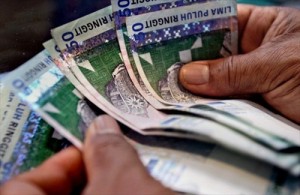It’s rainy money in Sarawak

From projects and vote-buying to patronage and betting, money politics in Sarawak is raining everywhere. But, as Bridget Welsh reports, there is little concern for the long-term damages as candidates and voters seek to cash in.
(New Mandala) – More than any other state in Malaysia, Sarawak’s elections have been seen to be determined by money. Vote buying and patronage are deeply intertwined in the state’s political fabric, as many voters look at the election period as one of festivity and entertainment.
Booze is purchased, and bounty is shared. Projects are announced, and even more ‘development’ promises are made in arguably one of Malaysia’s most neglected states.
The 2016 campaign is similarly being affected by the use of resources and highlights how uneven the playing field is in this election. Given the seriousness of the 1MDB scandal and the use of these tainted funds in Malaysia’s 2013 election, understanding the role money plays in determining the electoral outcomes is more important than ever. Money politics in Sarawak is not only intense; it is expensive. There is no question that the ruling coalition Barisan Nasional (BN) is using its control and access to resources to assure a victory in this Borneo state.
Less autonomy, more dependence and projects
One important development in the 2016 Sarawak campaign is the dominance of money from the federal government. The retirement of former Chief Minister Abdul Taib Mahmud has reduced the amount of Sarawak-based political resources able to fund the election. Current Chief Minister Adenan Satem is relying heavily on federal funds for assistance, and this accounts in part for why he has allowed Prime Minister Najib Razak, under a scandal clad cloud, to play such a prominent role in the campaign. Money talks, especially in the ‘cash is king’ Najib government.
Funding from the federal government takes multiple forms. Promised ‘development projects’ are the most common. Deputy Prime Minister Zahid Hamidi announced this week that federal funds promised to Sarawak reached RM20 billion (US$5 billion) of which RM16 billion is part of a multi-year project to construct the Pan-Borneo highway. These allocations come from a variety of ministries, with education, defense and rural development among the most prominent, and are often part of the 11th Malaysia Plan announced last year.
The use of development to sway Sarawak voters is not new, as it has been a long-standing practice. Voters regularly face the stark choice of losing road access, funds for housing and a potential new hospital if they vote against the incumbent government. Unlike the peninsula, Sarawak continues to lack basic infrastructure and services, especially in rural areas.
Project announcements are explicitly tied to political support, almost always featuring local BN politicians and a federal minister as the announcer. Najib has been the most prominent ‘gift giver’. This campaign the amount of money promised has reached new heights. Excluding the highway, voters in Sarawak are looking at an average per voter project allocation of nearly RM5000 (US$1250).
The politicisation of development projects takes two forms. They are strategically applied to areas where races are competitive. Consider for example the promised new bridge in Kampong Long Lama in Telung Usan (RM70 million) or the repairs to long houses in Limbang (RM50 million). The closer the contest, the more the promises and visits to hand out largesse.

